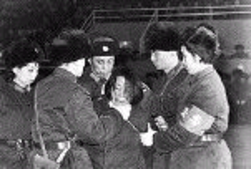That is to say, his face gets plastered on the Chinese Budweiser bottles. Go take a look — it is absolutely hilarious.
November 30, 2003

1980: Soldiers prepare party official Wang Shouxin for a public execution by dislocating her jaw so she can’t proclaim her innocence. Charming.
This is a remarkable review of a book I wrote about earlier, Red-Color News Soldier by Li Zhengsheng, full of previously unpublished photographs of the Cultural Revolution and the years following
What makes this review special is that the reporter and his wife actually lived in Beijing throughout the Cultural Revolution and the review is infused with the passion of an eyewitness.
You had to be there – and, 30-odd years ago, we were, a Canadian foreign correspondent and family living in Beijing, bullied by the loudspeakers that poured forth Mao worship, day and night, to hundreds of millions of Chinese. It was laughable, and it almost drove us crazy.
Those mad times came flooding back the other day when leafing through Red-Color News Soldier, an extraordinary book of images by Li Zhengsheng (Phaidon Press).
[….]
The photos can be startling. Monks stand in embarrassment, forced to hold up a banner reading: “To hell with the Buddhist scriptures. They are full of dog farts.” Softcover books litter the floor of a ransacked library; Li notes all the hardcover books had been taken by rival groups for use as projectiles.One which brings back memories shows a parade in which wax mangoes are carried reverently in glass cases behind a statue of Mao. This commemorated the great man’s gift of real mangoes to worker-peasant propaganda teams. I saw one of the originals when I visited a factory in Beijing; it was preserved in formaldehyde and exhibited like a sliver of the true cross.
This is one book I want to own. Maybe I can pick up a copy when I’m in Beijing next week…?
Amazing. A big fat article in the NY Times about the Guangzhou sex kitten. Everything you ever wanted to know about her is here.
For the past month, as China’s propaganda machine has promoted the nation’s new space hero or the latest pronouncements from Communist Party leaders, the Chinese public has seemed more interested in a 25-year-old sex columnist whose beat is her own bedroom.
“I think my private life is very interesting,” said the columnist, Mu Zimei, arching an eyebrow and tapping a Marlboro Light into an ashtray. She added: “I do not oppose love, but I oppose loyalty. If love has to be based on loyalty, I will not choose love.”
Mu Zimei is both reviled and admired, but she is not ignored. The country’s most popular Internet site, Sina.com, credits her with attracting 10 million daily visitors. Another site, Sohu.com, says Mu Zimei is the name most often typed into its Internet search engine, surpassing one occasional runner-up, Mao Zedong.
It’s great that the Times is giving this so much space, taking a look not only at who she is but at how this episode has ignited a major nationwide debate in China on women and sex. A debate that’s making the government squirm.
November 29, 2003
Damn. After cresting at more than 1,000 hits on Thursday, traffic’s now returning to normal. With a mere 422 hits yesterday, I hang my head in shame.
It taught me a big lesson: The more photos of gorgeous three-quarters naked Korean transsexuals I post, the more visitors I’ll get.
Well, it’s not really that bad, but the praise I offered yesterday is a bit more tempered today; at least regarding the technology (not the concept of the meta-blog).
It started when I went online this morning and saw that there were seven posts on the aggregator list by one poster, which might be totally legitmate; he may have posted them one after another all around the same time with no one posting in between. So, no problem. Then I went back about an hour later and saw that all seven posts had been replaced with new posts — so things were working as they were supposed to, right?
But then I returned a minute ago, and lo and behold all of those new posts are gone and all seven of the posts I saw more than two hours earlier were back! That means that some participating blogs could be getting little or no representation while a couple lucky bloggers are featured there for many hours.
This is just a technical glitch and obviously not intentional. But if people keep coming to Living in China and keep seeing the same posts listed, traffic will drop. A key reason for logging on again and again is, after all, to see what’s new in the community’s many blogs.
So I recommend we work this out as soon as possible. What makes Living in China so exciting is its robust, constantly changing nature and instant access to all that is new out there. That’s its “unique value proposition,” as we PR people love to tell our clients. If it doesn’t stay vital, it will rapidly lose its lustre.
November 28, 2003
As China becomes ever more capitalistic and obsessed with “hip Western culture,” how can the CCP keep today’s young people interested in stodgy old Mao? Easy! Turn him into a rapper:
In a desperate appeal to China’s fashionable youth, the Chinese Communist Party has approved the repackaging of Mao Tse-tung as a rap artist.
Mao’s favourite exhortation – the Two Musts – is to be set to music and released alongside pop versions of all the Great Helmsman’s old slogans, such as The East is Red and Serve the People.
The rap album to honour the 110th anniversary of Mao’s birth next month follows another record, A Red Sun, released to mark his centenary.
The Beijing Times said yesterday: “Ten years ago, the album A Red Sun brought a crimson tide of songs rushing through our music industry. This year, the China Record Company has finished the production of the powerfully red Mao Tse-tung and Us.”
With Mao’s 100th birthday fast approaching, the CCP is desperate to do whatever it can to rekindle enthusiasm for the Great Helmsman, now regarded by most young people, thank God, as utterly irrelevant.
So how did European Union and Chinese delegates meeting on human rights in China wrap up their meeting this week? By visiting an AIDS treatment center in Beijing. And in light of China’s history of not acknowledging its AIDS catastrophe, this is a breakthrough.
Stories like this are suddenly becoming the norm. Bill Clinton’s recent participation in an AIDS conference in Beijing received massive media coverage, despite the CCP chieftains distancing themselves from the event. And China declared November “AIDS Awareness Month” and has plans to further spread the message on Monday, World AIDS Day.
You have to remember that it wasn’t so long ago that the CCP was denying that AIDS existed in China at all. Even after the AIDS-tainted-blood made it into the news.
So what was it that made China finally take on the AIDS issue, speaking in public about it, putting ads about it on TV, making publicized visits to AIDS treatment centers?
I’d guess that it wasn’t one thing, but a confluence of factors, including a huge crescendo over the past 8 weeks or so of international concern over China’s apparent unwillingness or inability to embrace the situation.
It was only a few weeks ago that a whole new angle was added to the media coverage of China’s AIDS crisis — the concern that AIDS was more than a social/medical nightmare for China, but a financial nghtmare with direct and painful ramifications for the economy. If anythings going to perk up the CCP’s ears, it’s that.
It’s hard to say exactly where/when the turning point began (and it may even be too early to call it a turning point at all). I’m going to take an optimistic viewpoint for once, and venture that it’s real, similar in many ways to their sudden enlightenment over SARS: It took all hell breaking loose and a shrill international outcry to get the CCP off their asses in both instances. It was only in the face of chaos and catastrophe that they budged.
But once they crossed that threshold, once they acknowledged they had a crisis that could no longer be brushed aside or covered up, they pulled out the stops and dealt with it. I really think we are seeing that now. It’s only just starting, and there is no excuse for their taking so many years to arrive at this realization. And thanks to their keeping their heads in the sand, its going to be much more difficult and expensive to contain the epidemic.
Still, if they are serious now, if they are actually making a true commitment and not just gesturing, maybe, just maybe they can deal with AIDS while there is still time. If they aren’t serious, then China will almost certainly be the next Africa, and the misery and death will be compounded exponentially.
Related post: The indescribable tragedy of AIDS in China
Adam has an eyewitness account of the latest AIDS awareness ads on CCTV. From what I’ve been reading, there will be a lot more of these. It’s years late, but certainly a step in the right direction.
In an editorial today, the WaPo describes how much the “new” China is trying as hard as it can do divorce itself from the “old” China’s image as a prickly, paranoid, irrational and ideologically crazed nation.
And, the editorial says, it’s been doing a good job. Except when it comes to Taiwan, an issue that brings to life the old blustery, bellicose China we all know and love:
Beijing fears that constitutional changes could make Taiwan’s de facto separation from the mainland explicit, or that a referendum could be called on independence. Its apparent strategy is to frighten Mr. Chen into backing down — or more likely, push the United States into using its leverage on the Taiwanese president.
Such tactics demonstrate that China’s new leaders are not as pragmatic or enlightened as they seem. What Mr. Wen and Mr. Hu fail to perceive is that Mr. Chen is a typical democratic politician engaged in a tough reelection campaign. Though his party is pro-independence, he is unlikely to aggressively press that agenda even if he wins, if only because Taiwan’s economy is now deeply dependent on trade with the mainland and most Taiwanese people favor preserving the status quo.
Pointedly, the editorial cautions Bush not to give in to Wen’s demands that the US speak out against the referendum:
Mr. Bush should do no such thing. Instead, he should explain to Mr. Wen that his government’s approach to Taiwan needs some modernizing. Now that Taiwan is a democracy, threats of invasion will only strengthen its independence movement — just as the recent rhetoric only spurred the parliament into acting on the referendum law. The only way Beijing could achieve its goal of unification would be by winning over the Taiwanese public. That would take time and greater economic integration. It would also require China’s new leaders to deliver on Mr. Wen’s fluent rhetoric about democracy and rule of law.
Interesting. I read in a blog comment yesterday (don’t remember where) that Americans don’t realize that most Taiwanese want to reunify with the Mainland, but only after the Mainland has fixed up its act in regard to free elections, free trade, human rights, etc.
Would it be rude of me to suggest that this may prove a very, very long wait?
For those of you with the patience to have learned to read Chinese, Hailey Xie is now offering a Chinese-language blog that she says will show readers another side of her.

Comment